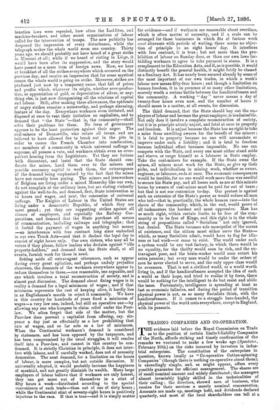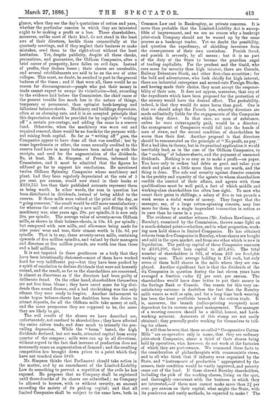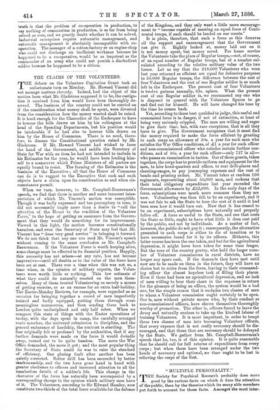TRADING COMPANIES AND CO-OPERATION. glance, when they see the day's
quotations of cotton and yarn, whether the particular concern in which they are interested ought to be making a profit or a loss. These shareholders, moreover, unlike most of their kind, do not stand in the least awe of their directors, heckle them unmercifully at the quarterly meetings, and if they neglect their business or make mistakes, send them to the right-about without the least hesitation. Yet, despite publicity, despite all these checks, precautions, and guarantees, the Oldham Companies, after a brief career of prosperity, have fallen on evil days. Instead of profits, they declare losses ; their shares are unsaleable, and several establishments are said to be on the eve of utter collapse. This must, no doubt, be ascribed in part to the general badness of the times ; and if that were all, there would be no reason for discouragement—people who put their money in trade cannot expect to escape its vicissitudes—but, according to the evidence laid before the Commission, the chief cause of the present trouble lies much less in the nature of things, temporary or permanent, than optimist book-keeping and fallacious balance-sheets. Machinery and buildings depreciate, often at an alarming rate, and it is an accepted principle that this depreciation should be provided for by regularly " writing off " a certain per-tentage, and adding the same to a reserve fund. Otherwise, when the machinery was worn out and required renewal, there would be no funds for the purpose with- out raising fresh capital. So far as " writing off " goes, the Companies appear to have done all that was needful ; but by some legerdemain or other, the sums annually credited to the reserve fund have in many instances been mixed up with the receipts, and used for the augmentation of the dividends. So, at least, Mr. A. Simpson, of Preston, informed the Commission, and it must be admitted that the figures he adduced go far to support his conclusions. He mentioned twelve Oldham Spinning Companies whose machinery and plant, had they been regularly depreciated at the rate of 5 per cent. per annum, would now stand in their books at £439,755 less than their published accounts represent them as being worth. In other words, the sum in question has been distributed in dividends, instead of being added to the reserve. If these mills were valued at the price of the day, as " going concerns," the result would be still more unsatisfactory ; for whereas the cost of erecting a new mill and fitting it with machinery was, nine years ago, 28s. per spindle, it is now only 20s. per spindle. The average value of seventy-seven Oldham mills, as shown in their balance-sheets, is 19s. 4d. per spindle ; but compared with new mills, and allowance being made for nine years' wear and tear, their utmost worth is 12s. 8d. per spindle. That is to say, these seventy-seven mills, containing upwards of five million spindles, and valued by their managers and directors at five million pounds, are worth less than three and a half millions.
It is not imputed to these gentlemen as a body that they have been intentionally dishonest—most of them have worked hard for very indifferent pay—but they have been pushed by a spirit of emulation to declare dividends that were not honestly earned, and the result, so far as the shareholders are concerned, is almost as disastrous as if the directors had been guilty of deliberate fraud. On the other hand, shareholders themselves are not free from blame ; they have cared more for big divi- dends than sound finance, and a bad stocktaking was the only offence they were ready to forgive. Another inducement to make bogus balance-sheets has doubtless been the desire to attract deposits, for all the Oldham mills take money at call, and the more prosperous they are supposed to be, the more they are likely to get.
The evil results of the abuses we have described are, unfortunately, not confined to shareholders ; they have affected the entire cotton trade, and done much to intensify the pre- vailing depression. While the " boom " lasted, the high dividends declared, but not made, attracted capital from every quarter of the compass ; mills were run up in all directions, without regard to the fact that increase of production does not necessarily cause an augmentation of demand ; and the resulting competition has brought down prices to a point which they have not touched since 1849.
Mr. Simpson thinks that Parliament should take action in the matter, and by an amendment of the Limited-Liability Law do something to prevent a repetition of the evils he has exposed. Ho proposes that no Company shall be registered until three-fourths of its shares are subscribed ; no Company be allowed to borrow, with or without security, an amount exceeding the moiety of its paid-up capital; and that all limited Companies shall be subject to the same laws, both in Common Law and in Bankruptcy, as private concerns. It is more than probable that the Limited-Liability Act is suscep- tible of improvement, and we see no reason why a bankrupt joint-stock Company should not be wound up by the same process as a bankrupt trader. Yet we doubt the possibility, and question the expediency, of shielding investors from the consequences of their own unwisdom. Punish fraud, and punish it severely, by all means ; but it is no part of the duty of the State to become the guardian angel of trading capitalists. For the prudent and the timid, who care more for security than high interest, there are Consols, Railway Debenture Stock, and other first-class securities ; for the bold and adventurous, who look chiefly for high interest, there are industrial enterprises and second-rate Foreign Stocks, and having made their choice, they must accept the responsi- bility of their acts. It does not appear, moreover, that any of the expedients which have been proposed for the protection of the unwary would have the desired effect. The probability, indeed, is that they would do more harm than good. One is that we should adopt the French law, whereby directors are made unlimitedly liable for the engagements of the Companies which they direct. In that case, no man of substance, unless he were extravagantly paid, would be a director ; the management of Companies would fall into the hands of men of straw, and the second condition of shareholders be worse than their first. Another proposal is that directors should be remunerated on the principle of " No profit, no pay." Not a bad idea in theory, but in its practical application it would inevitably lead, as in the case of the Oldham Companies, to the " cooking " of balance-sheets, and the payment of unearned dividends. Nothing is so easy as to make a profit—on paper. You have only to reckon bad debts as good, and value your stock and plant at a little more than they are worth, and the thing is done. The sole real security against disaster consists in the probity and capacity of the agents to whom shareholders confide the control of their affairs, and agents with these qualifications must be well paid, a fact of which middle and working-class shareholders too often lose sight. To men who count their gains in shillings, a salary of five or ten pounds a week seems a sinful waste of money. They forget that the manager, say, of a large cotton-spinning concern, may lose more for them by a single imprudent transaction in cotton or in yarn than he earns in a year.
The evidence of another witness (Mr. Joshua Rawlinson, of Burnley), examined by the Commission, throws some light on a much-debated point—whether, and in what proportion, work- ing men hold shares in limited Companies. He has obtained returns from five Companies in Burnley, whose shares are bought and sold in the open market, and from one other which is now in liquidation. The paid-up capital of these Companies amounts to £124,206, their loan capital to £61,465. The total number of shareholders is 661, of whom 213 are bond-fide working men. Their average holding is £51 each, but only seven of them hold shares in the mills where they are em- ployed. Another significant fact is that the dividends of the six Companies in question during the last eleven years have averaged a fraction tinder 2i per cent. per annum. The shareholders would have done better to put their money in the Savings Bank or Consols. One reason for this very un- satisfactory outcome is doubtless the fact that the Burnley mills weave as well as spin, and for a long time back weaving has been the least profitable branch of the cotton trade. It is, moreover, the branch (calico-printing excepted) most dependent for its success on good management. The manager of a weaving concern should be a skilful, honest, and hard- working autocrat. Autocrats of this stamp are not easily obtained ; they generally prefer working for themselves to toil- ing for others.
It will thus be seen that these so-called " Co-operative Cotton Mills " are co-operative only in name, that they are ordinary joint-stock Companies, about a third of their shares being held by operatives, who, however, do not work at the factories of which they are part-owners. We commend these facts to the consideration of philanthropists with communistic views, and to all who think that if industry were organised by the State, and "instruments of production " appropriated by the masses, their condition would be vastly improved, and poverty cease out of the land. If these shrewd Burnley shareholders, including the pick of the working classes, living on the spot, and thoroughly conversant with the business in which they are interested,—if these men cannot make more than 2i per cent. per annum on their capital, what might the State, with its ponderous and costly methods, be expected to make The truth is that the problem of co-operation in production, to say nothing of communism in production, is as far from being solved as ever, and we greatly doubt whether it can be solved. Industrial enterprises require autocratic management, and autocratic management is absolutely incompatible with co- operation. The manager of a cotton-factory or an engine-shop who could not discharge an inefficient workman because he happened to ba a co.-operative, would be as impotent as the commander of an army who could not punish a disobedient soldier because he happened to be a citizen.




































 Previous page
Previous page